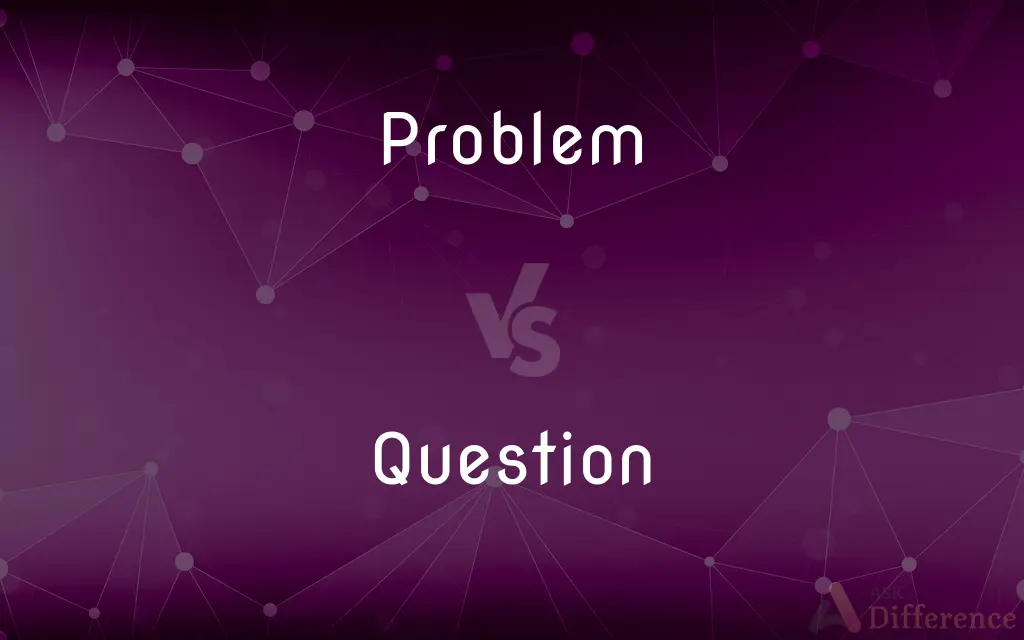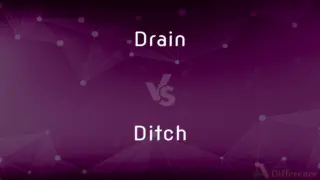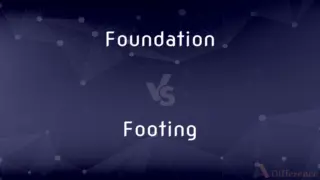Problem vs. Question — What's the Difference?
Edited by Tayyaba Rehman — By Maham Liaqat — Updated on March 31, 2024
A problem is a situation presenting difficulties or obstacles that need to be solved, often requiring action to overcome, while a question is an inquiry or expression of uncertainty seeking information or clarification.

Difference Between Problem and Question
Table of Contents
ADVERTISEMENT
Key Differences
A problem is typically a situation or issue that poses a challenge or difficulty, necessitating a solution or resolution. It implies a need for action to overcome an obstacle or to address a particular issue that is preventing progress or satisfaction. Problems can be complex and multifaceted, often requiring critical thinking, creativity, and sometimes a systematic approach to solve. On the other hand, a question is a request for information, clarification, or an answer to a specific point of uncertainty. Questions are fundamental to learning and understanding, serving as a tool for gathering information and insights.
While a problem may generate questions as part of the process of finding a solution, not all questions arise from problems. Questions can be asked out of curiosity, for confirmation, or to provoke thought, without necessarily being tied to a problem needing resolution. Conversely, identifying a problem often involves asking several questions to understand its nature and scope fully.
The nature of problems tends to be more dynamic, potentially impacting individuals, groups, or larger communities, and can have emotional, physical, financial, or social implications. Problems often require an evaluative judgment to identify and a strategic approach to address. Questions, however, are neutral and can be posed by anyone seeking knowledge, regardless of the presence of a problem.
In educational and professional settings, distinguishing between problems and questions is crucial for effective communication and problem-solving. Problems are identified and articulated so that they can be addressed, while questions are asked to gather the necessary information or clarify understanding to move towards a solution or to expand knowledge.
The intention behind a problem is to find a resolution that removes or alleviates the difficulty it presents, while the intention behind a question is to gain information, understand a concept more deeply, or explore possibilities. This difference highlights the proactive nature of problem-solving versus the investigative nature of questioning.
ADVERTISEMENT
Comparison Chart
Definition
A situation requiring a solution to overcome difficulties.
An inquiry seeking information or clarification.
Purpose
To be solved or resolved.
To gain knowledge or information.
Nature
Often complex and challenging.
Neutral, aimed at understanding or information gathering.
Outcome
Resolution or alleviation of the issue.
Answer or clarification.
Role in Learning
Stimulates critical thinking and problem-solving skills.
Facilitates learning and comprehension.
Compare with Definitions
Problem
An obstacle to be overcome.
Financial constraints were a significant problem for the startup.
Question
A request for information.
She raised a question about the project's deadline.
Problem
An issue demanding a solution.
The sudden software glitch became a major problem for the team.
Question
An inquiry seeking clarification.
The student asked a question to understand the concept better.
Problem
A challenge that needs solving.
Solving the math problem required complex calculations.
Question
A tool for investigation.
The detective asked questions to gather more evidence.
Problem
A situation causing difficulty.
The breakdown of the vehicle posed a problem for their travel plans.
Question
An expression of doubt.
There was a question regarding the accuracy of the data.
Problem
A complex scenario requiring resolution.
Addressing climate change is a global problem.
Question
A probe into understanding.
His question sparked a lively discussion in the class.
Problem
A matter or situation regarded as unwelcome or harmful and needing to be dealt with and overcome
The problem of ageism in Hollywood
They have financial problems
Question
A sentence, phrase, or gesture that seeks information through a reply.
Problem
An inquiry starting from given conditions to investigate or demonstrate a fact, result, or law.
Question
To ask a question or questions of (someone).
Problem
A question to be considered, solved, or answered
Math problems.
Question
To interrogate (a suspect, for example).
Problem
A situation, matter, or person that is hard to deal with or understand
Was having problems breathing.
Considered the main problem to be his boss. See Usage Note at dilemma.
Question
To pose a question or questions regarding (something); analyze or examine
Researchers questioning which of the methods will work.
Problem
A personal matter that causes one difficulty or needs to be dealt with
Felt her tyrannical boss had deep-seated problems.
Question
To express doubt about; dispute
Questioned his sincerity.
Questioned the expense report.
Problem
A misgiving, objection, or complaint
I have a problem with his cynicism.
Question
To ask questions.
Problem
Difficult to deal with or control
A problem child.
Question
A sentence, phrase or word which asks for information, reply or response; an interrogative.
What is your question?
Problem
Dealing with a moral or social problem
A problem play.
Question
A subject or topic for consideration or investigation.
The question of seniority will be discussed at the meeting.
There was a question of which material to use.
Problem
A difficulty that has to be resolved or dealt with.
She's leaving because she faced numerous problems to do with racism.
Question
A doubt or challenge about the truth, accuracy, or validity of a matter.
His claim to the property has come under question.
The story is true beyond question.
He obeyed without question.
Problem
A question to be answered, schoolwork exercise.
Study hard, but don't overdo it. The problems in the exam won't be difficult to solve.
Question
A proposal to a meeting as a topic for deliberation.
I move that the question be put to a vote.
Problem
A puzzling circumstance.
Question
Interrogation by torture.
Problem
Objection.
You got a problem with that?
Question
(obsolete) Talk; conversation; speech.
Problem
Difficulty in accepting or understanding or refusal to accept or understand.
You made your best honest effort; if they judge you harshly, that’s their problem, not yours.
Question
(transitive) To ask questions of; to interrogate; to ask for information.
Problem
(climbing) A set of moves required to complete a climb.
Question
(transitive) To raise doubts about; have doubts about.
Problem
(of a person or an animal) Difficult to train or guide; unruly.
Question
(intransitive) To ask a question or questions; inquire or seek to know; examine.
Problem
Causing a problem; problematic; troublesome.
Question
To argue; to converse; to dispute.
Problem
A question proposed for solution; a matter stated for examination or proof; hence, a matter difficult of solution or settlement; a doubtful case; a question involving doubt.
Question
The act of asking; interrogation; inquiry; as, to examine by question and answer.
Problem
Anything which is required to be done; as, in geometry, to bisect a line, to draw a perpendicular; or, in algebra, to find an unknown quantity.
Question
Discussion; debate; hence, objection; dispute; doubt; as, the story is true beyond question; he obeyed without question.
There arose a question between some of John's disciples and the Jews about purifying.
It is to be to question, whether it be lawful for Christian princes to make an invasive war simply for the propagation of the faith.
Problem
A state of difficulty that needs to be resolved;
She and her husband are having problems
It is always a job to contact him
Urban problems such as traffic congestion and smog
Question
Examination with reference to a decisive result; investigation; specifically, a judicial or official investigation; also, examination under torture.
He that was in question for the robbery. Shak.The Scottish privy council had power to put state prisoners to the question.
Problem
A source of difficulty;
One trouble after another delayed the job
What's the problem?
Question
That which is asked; inquiry; interrogatory; query.
But this question askedPuts me in doubt. Lives there who loves his pain ?
Problem
A question raised for consideration or solution;
Our homework consisted of ten problems to solve
Question
Hence, a subject of investigation, examination, or debate; theme of inquiry; matter to be inquired into; as, a delicate or doubtful question.
Question
Talk; conversation; speech; speech.
Question
To ask questions; to inquire.
He that questioneth much shall learn much.
Question
To argue; to converse; to dispute.
I pray you, think you question with the Jew.
Question
To inquire of by asking questions; to examine by interrogatories; as, to question a witness.
Question
To doubt of; to be uncertain of; to query.
And most we question what we most desire.
Question
To raise a question about; to call in question; to make objection to.
Question
To talk to; to converse with.
With many holiday and lady terms he questioned me.
Question
An instance of questioning;
There was a question about my training
We made inquiries of all those who were present
Question
The subject matter at issue;
The question of disease merits serious discussion
Under the head of minor Roman poets
Question
A sentence of inquiry that asks for a reply;
He asked a direct question
He had trouble phrasing his interrogations
Question
Uncertainty about the truth or factuality of existence of something;
The dubiousness of his claim
There is no question about the validity of the enterprise
Question
A formal proposal for action made to a deliberative assembly for discussion and vote;
He made a motion to adjourn
She called for the question
Question
An informal reference to a marriage proposal;
He was ready to pop the question
Question
Challenge the accuracy, probity, or propriety of;
We must question your judgment in this matter
Question
Pose a series of questions to;
The suspect was questioned by the police
We questioned the survivor about the details of the explosion
Question
Pose a question
Question
Conduct an interview in television, newspaper, and radio reporting
Question
Place in doubt or express doubtful speculation;
I wonder whether this was the right thing to do
She wondered whether it would snow tonight
Common Curiosities
Can a question lead to solving a problem?
Yes, asking the right questions is often crucial in identifying and solving problems.
Are all questions prompted by problems?
No, questions can arise from curiosity or the desire for knowledge without being tied to problems.
Why is identifying a problem important?
Identifying a problem is the first step in finding a solution and addressing the issue effectively.
How does solving a problem differ from answering a question?
Solving a problem involves overcoming a challenge, while answering a question involves providing information or clarification.
Is every question a sign of a problem?
No, questions can be asked for reasons other than problem-solving, such as learning or curiosity.
What is the difference between a problem and a question?
A problem is a challenge needing a solution, while a question is an inquiry seeking information.
How do professionals use problems and questions differently?
Professionals identify problems to address challenges in their work and ask questions to gather information necessary for solutions.
Can a problem exist without questions?
While a problem can exist on its own, questions are often necessary to explore and resolve it.
Can asking questions prevent problems?
Yes, proactive questioning can identify potential issues before they become significant problems.
Can the same situation be both a problem and a question?
A situation might present a problem and also prompt specific questions aimed at resolving it.
How are problems and questions related in the learning process?
Questions help gather information and clarify understanding, which is essential in solving problems.
What role do questions play in problem-solving?
Questions help define the problem, explore potential solutions, and understand the issue more deeply.
How do effective communicators use problems and questions?
Effective communicators use problems to focus efforts on finding solutions and questions to clarify and gather the necessary information.
Is it necessary to understand the problem before asking questions?
Understanding the problem can help frame more effective questions, but asking questions is also a key part of understanding the problem itself.
Why are both problems and questions important in education?
They stimulate critical thinking, problem-solving, and inquiry, which are essential for learning and development.
Share Your Discovery

Previous Comparison
Drain vs. Ditch
Next Comparison
Foundation vs. FootingAuthor Spotlight
Written by
Maham LiaqatEdited by
Tayyaba RehmanTayyaba Rehman is a distinguished writer, currently serving as a primary contributor to askdifference.com. As a researcher in semantics and etymology, Tayyaba's passion for the complexity of languages and their distinctions has found a perfect home on the platform. Tayyaba delves into the intricacies of language, distinguishing between commonly confused words and phrases, thereby providing clarity for readers worldwide.














































